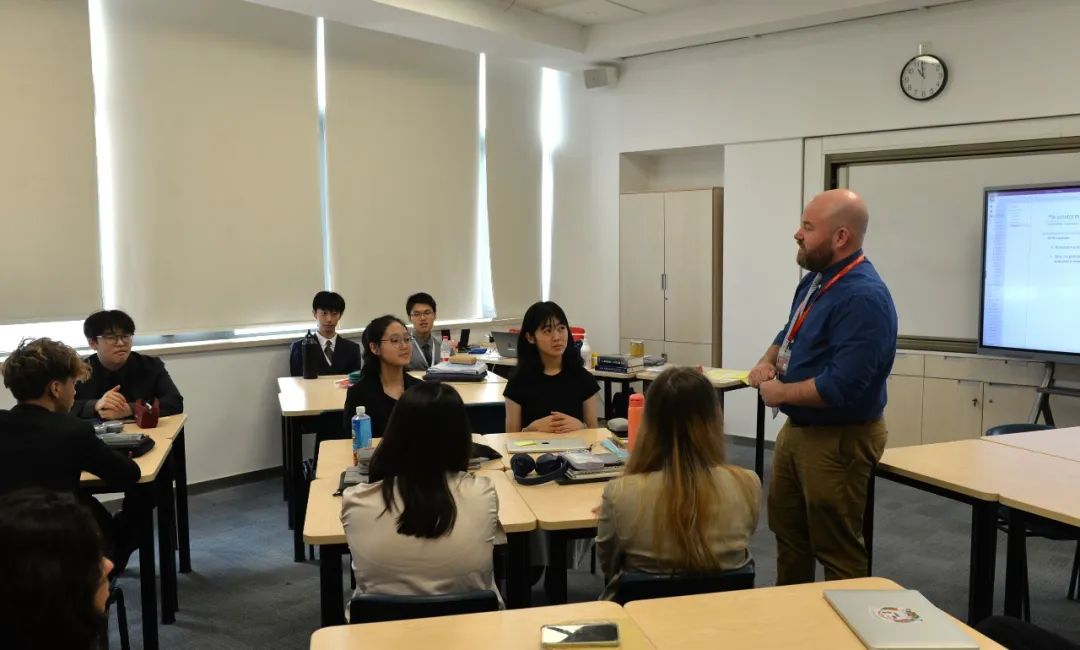Subject Spotlight: How Do We Learn English A at DCSZ?
Have you ever wondered how our expert teachers plan and deliver lessons that help students reach their full academic potential? Last time we posted our Subject Spotlights series of Business, English, chemistry, physics, drama, CS, Geography, and music. Now let's see how our teaching English A makes a difference to our students!
This time we interviewed Mr Joe Lehman, Senior School English Teacher, Head of Language and Literature, who gave us some insights into the English A Studies at our college.
Hello, Mr Lehman! First of all could you please introduce yourself and your teaching background?
I have been teaching English for 13 years. I graduated with a BA in English from James Madison University in 2007. Furthering my education, I obtained a Master’s Degree in Education from the University of Mary Washington in 2014. After teaching for five years in the United States, my wife and I decided to pursue careers in international education. Currently, I have been teaching English in China for eight years. After completing two years teaching MYP English at Guangdong Country Garden School in Foshan, I moved to Suzhou and have taught MYP and DP English Language and Literature at Suzhou Singapore International School for the past six years.
Could you briefly introduce the courses you teach at DCSZ?
I teach English A (English as a First Language) to Year 10 students and Year 12-13 students. Year 10 students learn IGCSE English A, and Year 12-13 students learn IB English A. English A focuses on the analysis and appreciation of the English language and literature. Students explore various styles of literature, including poetry, novels, songs, films, essays, cartoons, advertisements, and more.
Our course is designed like a spiral staircase; students revisit and refine their skills throughout their study of the subject. A crucial skill to foster is the students’ ability to delve deep into understanding an author's intention for producing a text and its impact on the audience. Students engage in close reading, textual analysis, and the exploration of literary techniques and themes. Students are encouraged to develop their own interpretations, support their ideas with evidence from the texts, and engage in critical discussions and written responses.
To me, learning English is a process of input and output. The input includes reading and listening, while the output involves writing and speaking. Therefore, students need to make logical and analytical claims about texts, expressing their ideas effectively.

Thanks for that introduction! Please tell us about a unit or lesson that you taught recently.
Let's take Year 10 as an example. In this year, students learn a novel written by Chinua Achebe, an African writer. This provides students with a valuable opportunity to explore a culture that they are seldom exposed to. Through reading this novel, students can gain a deeper understanding of different cultures and develop diverse perspectives. This novel also serves to prompt student reflection on their own cultural identity, as they reflect on the experiences of human beings within the story. The novel also touches upon the topic of colonialism. Apart from improving their English skills, due to the unique background of the novel, students will also subconsciously learn to respect other perspectives, thus broadening their worldview.
Y10 IGCSE students explored the connection between food and cultural identity - performing admirably in the kitchen and preparing dishes originating from Nigeria. This connects with our studied text, Chinua Achebe’s ‘Things Fall Apart.’
Beyond the subject learning, how did this also prepare students to Live Worldwise?
The skills students develop through English learning are highly valuable. Firstly, critical thinking abilities are developed. The study of English Language and Literature equips students with essential skills in literary analysis, critical thinking, effective communication, and cultural awareness. These skills not only prepare them for further academic pursuits in literature, humanities, or related fields but also foster a lifelong appreciation for literature and the power of language. Additionally, through the study of literature, students learn to respect different cultures as it broadens their perspectives and enhances their understanding of diverse backgrounds. Furthermore, the skills acquired are interconnected and applicable to their university studies, careers, and daily lives.

What strategies did you use to support students’ learning in this unit?
Our class consists of both native and non-native English-speaking students. In terms of language instruction, I will provide them with writing and speaking models, guiding them with approaches and frameworks relevant to analysis. The study of etymology is also crucial. By understanding the roots and suffixes of words, students can grasp the origins of words and infer meanings of unfamiliar words based on context. Additionally, I will provide continuous feedback and support to help students excel in their English language and literature studies.
What can students do to keep improving their English A knowledge?
I suggest that students should engage in reading various types of texts and strive to comprehend the deeper implications within them. It is also important for students to step out of their comfort zones. This includes challenging themselves with slightly more complex reading materials. As I mentioned before, it is a process of input and output. Thus, students must attempt to express themselves, both in written form and verbally. Students must practice providing output about the texts they’ve read/watched. By absorbing knowledge, students are able to effectively express their understanding of it.
Thanks to Mr Lehman for introducing his recent units and explaining what English A learning is like at DCSZ.






